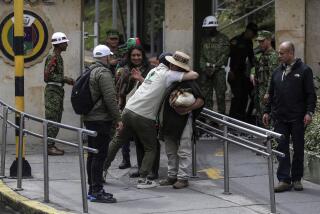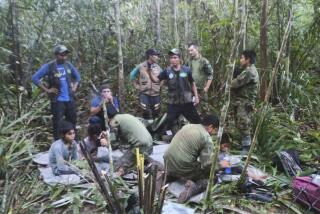Colombia heart hospital goes to wherever children are in need
- Share via
Reporting from Leticia, Colombia —
Eleven-year-old Nubia Quirino was living under a death sentence, and it showed in her blue-grayish complexion, swollen fingertips and breathlessness at the slightest exertion.
Her parents, Herminio and Zoila Quirino, had been told by doctors in this steamy Amazon River port town that there was no hope for a child with her complex heart problems, including being born with only one atrioventricular valve instead of two.
“We were resigned to losing her,” said Herminio, a farmer and member of the Ticuna native community on the outskirts of Leticia.
For many indigenous people settled in remote jungle or mountain areas of Colombia, the kind of care that Nubia needs is out of reach.
But the dark-eyed wisp of a girl got a possible reprieve this month after she was examined by a team of doctors fromColombia’sleading pediatric hospital, the Children’s Heart Foundation in Bogota. They came here to conduct a two-day, pro bono “flying” clinic to diagnose poor children with heart problems, and, if necessary, take them back to the capital for treatment.
Cardiologist Miguel Ronderos immediately declared Nubia to be in heart failure and scheduled her for surgery in Bogota this month. All her medical, travel and housing costs will be paid by the hospital’s charitable foundation, which budgets $1.5 million a year to help poor children.
“I hope we’re in time, because she is in danger of suffering a fatal heart attack at any moment,” said Ronderos, who got part of his training at the University of Alabama-Birmingham School of Medicine. “There is no guarantee she will make it, but there is a good chance.”
If the first operation is a success, Ronderos said, she will need several more. Still, the girl’s upcoming trip to Bogota for surgery comes as a “total surprise, a gift from God,” her father said. “We thought there were no options.”
Giving poor kids life-saving options has been part of the Children’s Heart Foundation mission since its founding by two brothers, Reinaldo and Camilo Cabrera, who returned to Bogota in the early 1970s after getting cardiology training at Houston’s Texas Medical Center.
They devised a financing scheme in which fees paid by wealthier heart patients, plus donations, would underwrite treatment for less fortunate ones. At first their clinic offered treatment only to youths from Bogota, or to those who could travel there.
But since 1986, mobile medical “brigades” have gone to out-of-the-way or impoverished Colombian cities, where they conduct examinations at cooperating hospitals, such as Leticia’s San Rafael clinic. This month’s visit to Leticia by Ronderos and pediatricians Carolina Casas, Linibeth Cruz and Sara Aguilera, at which they examined 305 children, is one of 10 such forays planned this year.
Last year, the team examined 3,165 children during the trips, and 270 of them were taken to Bogota for further treatment. Of those, 189 underwent heart surgery.
“Without it, all would have died soon or over the next few years,” said Fabio Hencker, the Children’s Heart Foundation’s longtime community relations director, whom hospital doctors credit for expanding the program.
To get the word out before the visits, the team depends on a network of local radio stations and religious organizations to spread notice that all children suspected of having heart problems will be examined for free. Before the team’s visit to Leticia, the Colombian army had hand-delivered posters to each of the city’s 33 barrio captains and to dozens of indigenous community curacas, or mayors.
“Leticia is so isolated, we don’t often have the opportunity of getting this kind of service,” said Samara Cuelo, an indigenous mother who brought her 1-year-old son, Jesue, in for an exam because his heart had been “palpitating” lately. “It’s the only way we have of being aware of problems our kids might have.”
His exam revealed that Jesue had no serious heart problem. In fact, of all the children the doctors saw in Leticia, only four, including Nubia, will need follow-up care.
“Sometimes,” Ronderos said, “solving the problem is just in giving the families peace of mind by reassuring the family that everything is all right.”
Kraul is a special correspondent.
More to Read
Sign up for Essential California
The most important California stories and recommendations in your inbox every morning.
You may occasionally receive promotional content from the Los Angeles Times.













